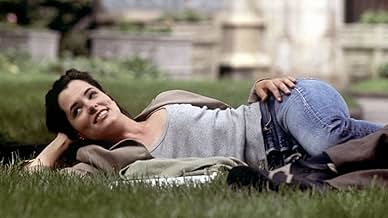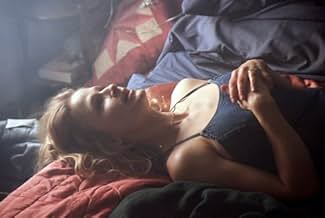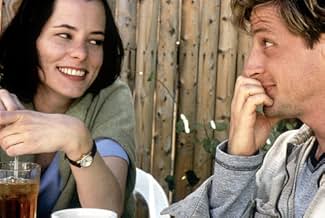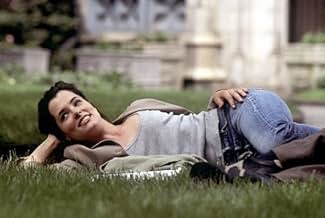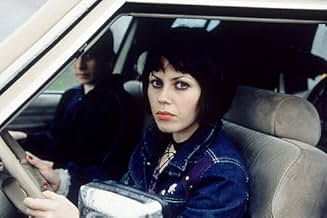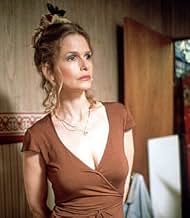Ajouter une intrigue dans votre langueThree women's escapes from their afflicted lives. Each struggles to flee from the men who confine their personal freedom.Three women's escapes from their afflicted lives. Each struggles to flee from the men who confine their personal freedom.Three women's escapes from their afflicted lives. Each struggles to flee from the men who confine their personal freedom.
- Réalisation
- Scénario
- Casting principal
- Récompenses
- 6 victoires et 5 nominations au total
John Ventimiglia
- Narrator
- (voix)
Joel de la Fuente
- Thavi Matola
- (as Joel De La Fuente)
Avis à la une
This film, directed and written by Rebecca Miller, is a very satisfying experience for a new director who, here, is adapting her own material with a lot of relish and savoir-faire. There's a certain elegance in the way she treats her characters, always respectful, yet incisive. The only complain we could raise is the fact that each story is very short, so when we are still savoring each one, individually, Ms Miller, for reasons of timing, pulls them from under us.
The first story, Delia, shows a woman's worst fears in being married to a wife beater of the worst kind. She might have had dreams of making a happy home for her family, but her man has another thing in mind. This woman is a step above white trash. She tries hard to get herself together but everything keeps interfering with her independence. Played with gusto by Kyra Sedwick, Delia ends up as a waitress in order to support herself and the children. Her encounter with the bully from the restaurant is an exercise in how low they want her to go, but she comes out a winner.
The second story, Greta, is the best of the three. With the help of the great Parker Posey, this Greta comes out as the tough woman she wants everyone to think of her, but deep down, inside her, she's a vulnerable and frightened and unfulfilled over achiever. Ms Posey has never shown so many nuances in a performance that is so economic in the terms that are dictated by the length of the story. We get to know more about her than the narrator ever tells us. Every expression on this actress face is true. It's surprising what has been achieved here with the collaboration of the director and the player.
The last story, Paula, is the weakest. It's all about a very confused young woman who's out on the road to see her parents. She has very deep problems. Along the way she picks up a hitchhiker who stays with her through the trip. Paula is in a voyage of discovering, but little does she know that what she needs is what she has left at home: her Haitian man, who obviously cares a lot about her. As played by Fairuza Balk, she shows the turmoil in her head that only she can resolve.
We hope Miss Miller's next time out will be very soon because she's got a feel for getting inside her characters and finding angles they didn't even suspect of having.
The first story, Delia, shows a woman's worst fears in being married to a wife beater of the worst kind. She might have had dreams of making a happy home for her family, but her man has another thing in mind. This woman is a step above white trash. She tries hard to get herself together but everything keeps interfering with her independence. Played with gusto by Kyra Sedwick, Delia ends up as a waitress in order to support herself and the children. Her encounter with the bully from the restaurant is an exercise in how low they want her to go, but she comes out a winner.
The second story, Greta, is the best of the three. With the help of the great Parker Posey, this Greta comes out as the tough woman she wants everyone to think of her, but deep down, inside her, she's a vulnerable and frightened and unfulfilled over achiever. Ms Posey has never shown so many nuances in a performance that is so economic in the terms that are dictated by the length of the story. We get to know more about her than the narrator ever tells us. Every expression on this actress face is true. It's surprising what has been achieved here with the collaboration of the director and the player.
The last story, Paula, is the weakest. It's all about a very confused young woman who's out on the road to see her parents. She has very deep problems. Along the way she picks up a hitchhiker who stays with her through the trip. Paula is in a voyage of discovering, but little does she know that what she needs is what she has left at home: her Haitian man, who obviously cares a lot about her. As played by Fairuza Balk, she shows the turmoil in her head that only she can resolve.
We hope Miss Miller's next time out will be very soon because she's got a feel for getting inside her characters and finding angles they didn't even suspect of having.
I am hard-pressed to explain the praise heaped on this movie, and must sadly choose the obvious. This film would never have been touted as it has if it were made by someone other than Arthur Miller's daughter/Daniel Day Lewis's wife.
Of the film's three vignettes--domestic violence survivor, conflicted editor, and confused runaway--the second is most telling. Greta, the failure to her family, craves success and power in the literary world and only needs to have her innate talents recognized to do so. Her skill is "trimming the fat" from others' writing. However, Ms. Miller seems to have had no such attention paid to her own work. The incessant and intrusive voiceover dialogue, I assume taken directly from her collection of short stories, features pseudo-deep lines that made me literally laugh out loud.
In addition, I found many of the camera tricks and plot devices amateurish and the characters shallow and essentialized. I cannot recommend this film, which basks in its own specialness and its claims to gritty reality. Ms. Miller is a tourist in the lives of the struggling women she attempts to portray.
Of the film's three vignettes--domestic violence survivor, conflicted editor, and confused runaway--the second is most telling. Greta, the failure to her family, craves success and power in the literary world and only needs to have her innate talents recognized to do so. Her skill is "trimming the fat" from others' writing. However, Ms. Miller seems to have had no such attention paid to her own work. The incessant and intrusive voiceover dialogue, I assume taken directly from her collection of short stories, features pseudo-deep lines that made me literally laugh out loud.
In addition, I found many of the camera tricks and plot devices amateurish and the characters shallow and essentialized. I cannot recommend this film, which basks in its own specialness and its claims to gritty reality. Ms. Miller is a tourist in the lives of the struggling women she attempts to portray.
There's a point about an hour and twenty-five minutes into this film where the credits begin to roll. At this moment the viewer realizes "Personal Velocity" has come to a close. There's no plot to this film and, therefore, no ending. "PV" is a trio of vignettes, each about a young woman with some sort of sex/relationship crisis. Delia is the high school tramp turned battered housewife. Greta is a Jewish-American princess bored with her WASP husband. And Paula is a pregnant punker chick trying to mother a teen boy runaway who sucks his thumb. Yes, this is an arthouse project. It screams "We're an indie production! We can't afford light kits and tripods! We're all working for scale or for free! We made this film because we LOVE it!" In defense of Rebecca Miller: she wrote a book, adapted it for the screen, and cobbled together the funding and talent to turn it into a movie. Of course she has A-list family connections, but this is her own work. And it's a lot more than most of us could ever do. You go, girl! But unfortunately, it is a boring piece of work. The three lead characters are just plain dull and unsympathetic. It's hard to like them, and harder to identify with any of them. They've all made their own poor choices and now spend their screen time plotting an escape.
The male voice narration doesn't work. It's heavy-handed and annoying in a bad documentary way. Why can't the ladies narrate their own stories? What's wrong with Delia telling us in her own words how she spent most of high school entertaining the boys? Story line and characters aside, there's some potent acting here. Ms Miller enlisted top quality players Kyra Sedgwick, Parker Posey, and Fairuza Balk to perform the leads. Collectively, they are a knock-out. The supporting cast is spot-on. But you can only do so much with a one-note song. I really wanted to like this little movie. But I didn't.
The male voice narration doesn't work. It's heavy-handed and annoying in a bad documentary way. Why can't the ladies narrate their own stories? What's wrong with Delia telling us in her own words how she spent most of high school entertaining the boys? Story line and characters aside, there's some potent acting here. Ms Miller enlisted top quality players Kyra Sedgwick, Parker Posey, and Fairuza Balk to perform the leads. Collectively, they are a knock-out. The supporting cast is spot-on. But you can only do so much with a one-note song. I really wanted to like this little movie. But I didn't.
A critic I read before seeing this movie (Lynden Barber of the Sydney Morning Herald) opined that it was a book illustrated with film rather than a proper movie. He's right, but that does not make it a complete write-off. There is as much voice-over as in a football match (why use a male?) but the visuals still convey some of the stories, which are not all without interest.
There are three separate stories of women having trouble with men; two from the working class and one an upwardly mobile book editor. They are tenuously connected by a street incident. One has a bashing husband, another, a husband she has outgrown, and the third has problems with her boyfriend, her stepfather and her maternal instinct. All seem to favour running away as the solution; stand and fight is not the female way, at least not in New York State.
The author of the original short stories is Rebecca Miller, who also directed from her own screenplay. This certainly accounts for the literary quality. Rebecca has a famous literary father, the great Arthur Miller, and I suspect he is in the film somewhere as a character or at least a presence. The working class girl stories are too trite to be involving (though very well played by Kyra Sedgwick and Fairuza Balk) but the middle story of the book editor (played coolly by Parker Posey) rings true. The use of digital video suits the subject-matter (Dogma 95 on the Hudson) and the whole thing is competently realised. It is the weakness in the first and third stories that disappoints.
There are three separate stories of women having trouble with men; two from the working class and one an upwardly mobile book editor. They are tenuously connected by a street incident. One has a bashing husband, another, a husband she has outgrown, and the third has problems with her boyfriend, her stepfather and her maternal instinct. All seem to favour running away as the solution; stand and fight is not the female way, at least not in New York State.
The author of the original short stories is Rebecca Miller, who also directed from her own screenplay. This certainly accounts for the literary quality. Rebecca has a famous literary father, the great Arthur Miller, and I suspect he is in the film somewhere as a character or at least a presence. The working class girl stories are too trite to be involving (though very well played by Kyra Sedgwick and Fairuza Balk) but the middle story of the book editor (played coolly by Parker Posey) rings true. The use of digital video suits the subject-matter (Dogma 95 on the Hudson) and the whole thing is competently realised. It is the weakness in the first and third stories that disappoints.
I saw this film tonight at the First Annual Tribeca Film Festival and understood its success at Sundance. In short, this film is about the awakening of three different women in very different lives and circle around a news report of a shooting in Manhattan and an ensuing car accident. With the telling of each woman's tale, Miller uses a brilliant 'degree of relation' to the accident in order to develop an engaging and powerful film.
Delia casually watches the news report of the accident while waiting for the cook to bring up her next order in a small-town diner in upstate New York. Though the audience does not see a particularly unusual response that she has to it, we can imagine that her difficult circumstances allow her to relate to it on a level of shared human suffering.
Greta, who's story is told in a series of flashbacks, watches it on the morning news minutes before she has her epiphany about her failing marriage and the new turn that her life is taking as a prominent editor for a large Manhattan publishing house. Because it is the only scene in her story that takes place in the present time, the audience is left to wonder what sort of pivotal role the news report has played in her epiphany.
Finally, Paula's story brings the accident close to home as she is a witness to it. Her epiphany was a direct result of the accident since it was a near-death experience for her. She's not only shocked from the impact of it, but her struggle to explain it with cosmic signs allows her to transcend the accident and the events following it.
The performances were real, the direction was brilliant, and the common thread that ran through the intimate details of the women's awakenings flowed easily, despite the segmented telling of their tales. Miller's work in this film has inspired me to seek out her feature debut, _Angela_ as well.
Delia casually watches the news report of the accident while waiting for the cook to bring up her next order in a small-town diner in upstate New York. Though the audience does not see a particularly unusual response that she has to it, we can imagine that her difficult circumstances allow her to relate to it on a level of shared human suffering.
Greta, who's story is told in a series of flashbacks, watches it on the morning news minutes before she has her epiphany about her failing marriage and the new turn that her life is taking as a prominent editor for a large Manhattan publishing house. Because it is the only scene in her story that takes place in the present time, the audience is left to wonder what sort of pivotal role the news report has played in her epiphany.
Finally, Paula's story brings the accident close to home as she is a witness to it. Her epiphany was a direct result of the accident since it was a near-death experience for her. She's not only shocked from the impact of it, but her struggle to explain it with cosmic signs allows her to transcend the accident and the events following it.
The performances were real, the direction was brilliant, and the common thread that ran through the intimate details of the women's awakenings flowed easily, despite the segmented telling of their tales. Miller's work in this film has inspired me to seek out her feature debut, _Angela_ as well.
Le saviez-vous
- AnecdotesMaria Elena Ramirez's debut.
- Citations
Greta Herskowitz: How could he still love me? If he does, it's because he doesn't know me. I'm rotten with ambition, a lusty little troll, the kind of demon you'd find at the bottom floor of hell pulling fingernails off the loansharks.
- Crédits fousTo my mother
- ConnexionsFeatured in Personal Velocity: Creating 'Personal Velocity' (2003)
Meilleurs choix
Connectez-vous pour évaluer et suivre la liste de favoris afin de recevoir des recommandations personnalisées
- How long is Personal Velocity?Alimenté par Alexa
Détails
Box-office
- Budget
- 125 000 $US (estimé)
- Montant brut aux États-Unis et au Canada
- 811 299 $US
- Week-end de sortie aux États-Unis et au Canada
- 29 943 $US
- 24 nov. 2002
- Montant brut mondial
- 890 502 $US
- Durée1 heure 26 minutes
- Couleur
- Mixage
- Rapport de forme
- 1.85 : 1
Contribuer à cette page
Suggérer une modification ou ajouter du contenu manquant

Lacune principale
By what name was Personal Velocity: Three Portraits (2002) officially released in India in English?
Répondre

